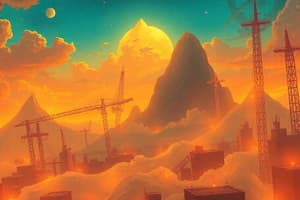Podcast
Questions and Answers
The economic problem refers to the struggle between unlimited ______ and limited resources.
The economic problem refers to the struggle between unlimited ______ and limited resources.
wants
Basic wants are essential goods and services needed for ______.
Basic wants are essential goods and services needed for ______.
survival
Goods that are used to produce other goods are known as ______ goods.
Goods that are used to produce other goods are known as ______ goods.
capital
Collective wants are services demanded by the entire ______.
Collective wants are services demanded by the entire ______.
The reward for land as a factor of production is ______.
The reward for land as a factor of production is ______.
Services like medical care and education are considered ______ actions.
Services like medical care and education are considered ______ actions.
Consumer goods are those that immediately satisfy consumer ______.
Consumer goods are those that immediately satisfy consumer ______.
The economic problem also involves deciding what to ______ and how to allocate resources.
The economic problem also involves deciding what to ______ and how to allocate resources.
Consumers contribute to the cost of providing collective wants by paying ______, subsidised tolls & fares.
Consumers contribute to the cost of providing collective wants by paying ______, subsidised tolls & fares.
Complementary goods are two products generally consumed ______.
Complementary goods are two products generally consumed ______.
When one product's price goes up, consumers will often increase their demand for its ______.
When one product's price goes up, consumers will often increase their demand for its ______.
Recurring wants are wants that need to be repeatedly satisfied at ______ intervals.
Recurring wants are wants that need to be repeatedly satisfied at ______ intervals.
Capital refers to 'The Produced Means of Further ______' used to produce more goods/services.
Capital refers to 'The Produced Means of Further ______' used to produce more goods/services.
The factor income return/payment for providing capital for the production process is called ______.
The factor income return/payment for providing capital for the production process is called ______.
The factor income return for natural resources, such as land and minerals, is called ______.
The factor income return for natural resources, such as land and minerals, is called ______.
Labour is the human effort put into the production of goods and services, and its factor income return is ______.
Labour is the human effort put into the production of goods and services, and its factor income return is ______.
Flashcards are hidden until you start studying
Study Notes
Nature of Economics
- Economics is classified as a social science, focusing on the study of human behavior in relation to resources and needs.
- Central to economics is the problem of resource scarcity versus unlimited wants, necessitating choices about allocation.
Needs and Wants
- Basic Needs: Essential goods and services required for survival, such as food and shelter.
- Luxury Wants: Non-essential items for personal satisfaction, contributing to an improved standard of living.
- Individual Wants: Personal desires fulfilling the needs of specific consumers.
- Collective Wants: Needs of society that are met through government provisions, often expensive for private firms to supply.
Resources: Factors of Production (CELL)
- Capital: Includes tools, machinery, and money used to produce goods; earns interest as a return.
- Enterprise: Refers to entrepreneurship and the risk involved in managing production factors; earns profit as reward.
- Land: Encompasses all natural resources; generates rental income.
- Labour: Human effort contributing to production; compensated with wages.
The Problem of Scarcity
- Key decision questions include:
- What to produce?
- How much to produce?
- How to produce?
- How to allocate goods and services?
- Allocation methods include first-come-first-served, voting, and competition for limited resources.
Economic Problem Definition
- Economic problem arises from attempting to allocate scarce resources to meet unlimited human wants for goods and services.
Goods and Services
- Goods: Tangible items satisfying economic wants (e.g., food, books, furniture).
- Consumer Goods: Produced for immediate consumption (e.g., food, petrol); can be single-use or durable.
- Capital Goods: Used in producing consumer goods; they depreciate over time.
- Services: Intangible actions satisfying wants (e.g., education, healthcare).
Basic vs Luxury Wants
- Basic wants lead to bare survival, while luxury wants enhance quality of life.
Complementary and Substitute Goods
- Complementary Goods: Products consumed together, such as cars and petrol.
- Substitutes: Alternatives to one another; demand increases for one when the price of the other rises (e.g., butter vs margarine).
Recurring Wants
- Definition: Wants needing regular satisfaction, such as food and water, often classified under multiple categories.
Factors of Production: Factor Incomes
- Returns on factors of production are defined as:
- Capital: Interest
- Enterprise: Profit
- Land: Rent
- Labour: Wages
Factor Decisions and Implications
- Economic activities aim to maximize returns by efficiently allocating resources, emphasizing the importance of allocative efficiency.
Studying That Suits You
Use AI to generate personalized quizzes and flashcards to suit your learning preferences.




